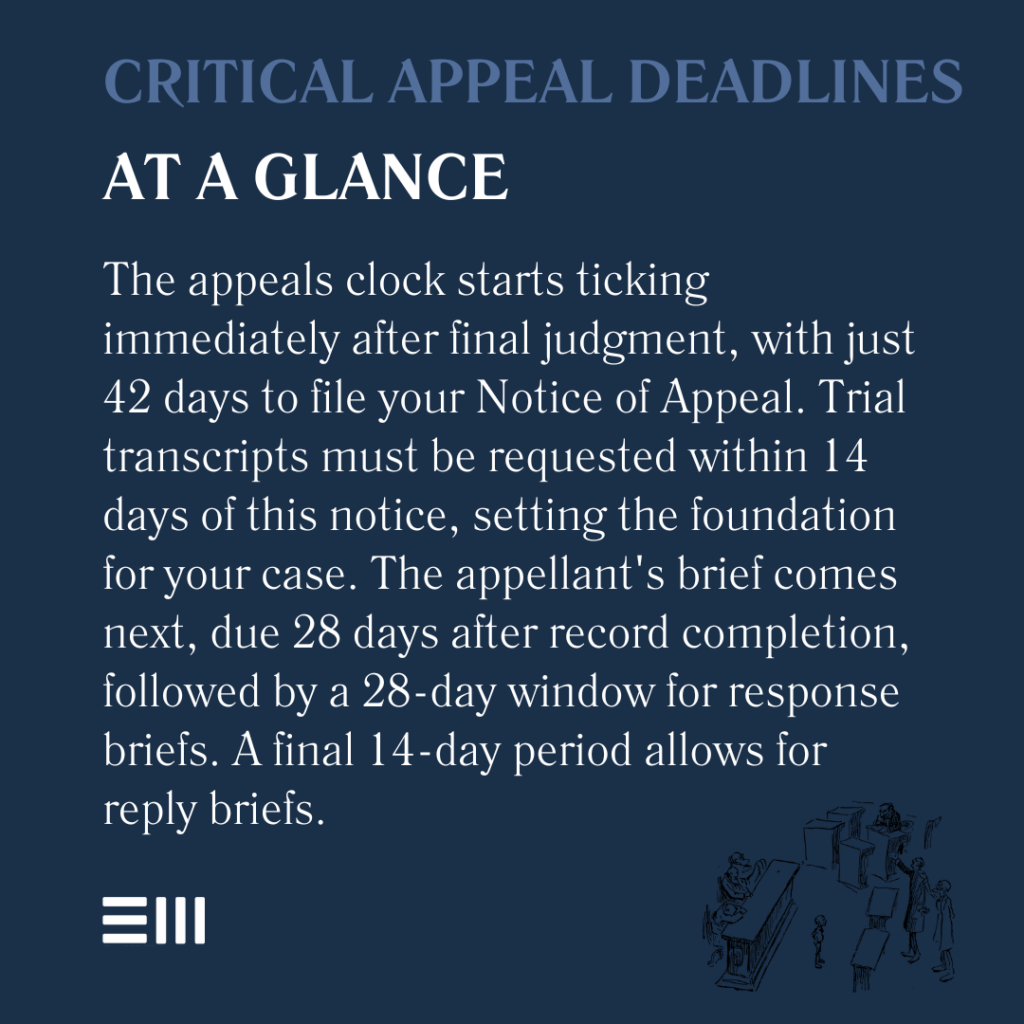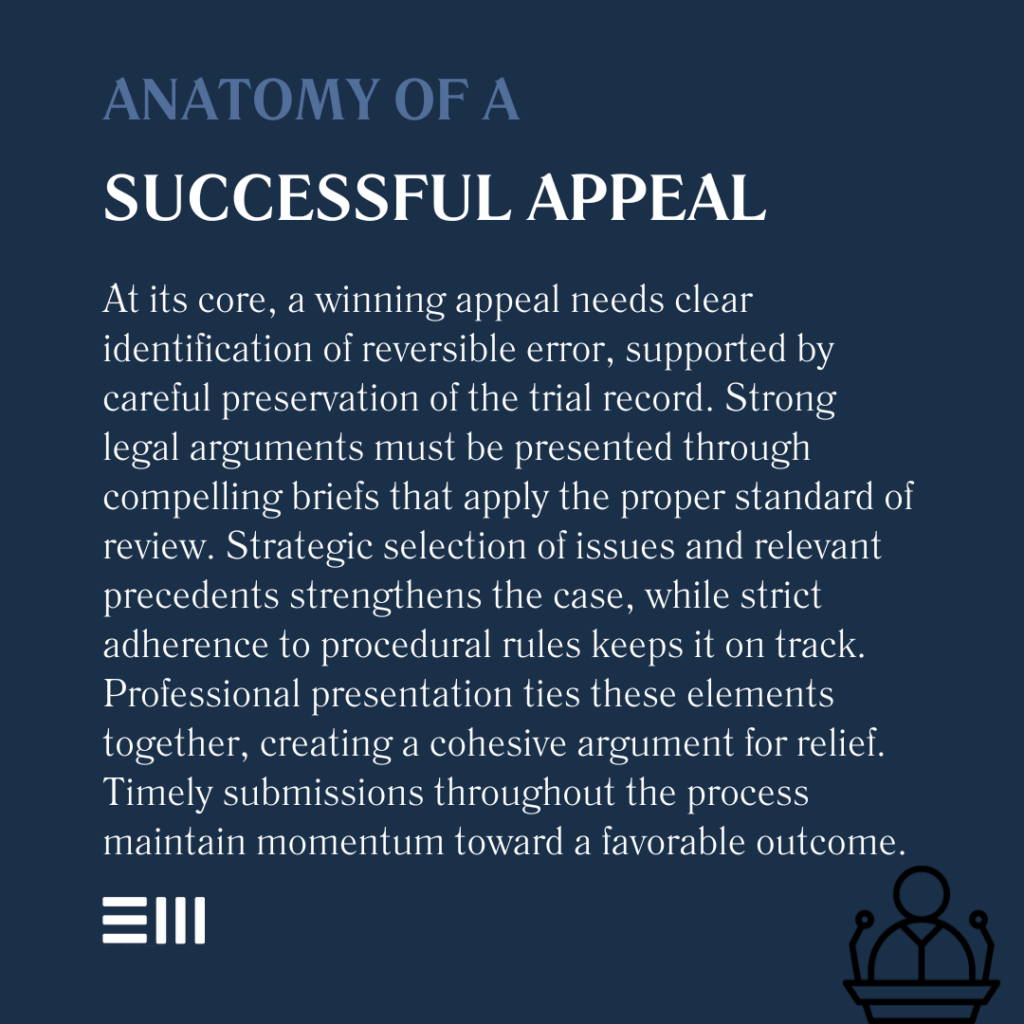
A single overlooked deadline, one procedural misstep, or a misunderstood filing requirement can permanently close the door on your right to appeal.
While trial court proceedings focus on discovering truth through evidence and testimony, the appellate world operates in a separate realm of precise procedures, exacting standards, and unforgiving timelines.
For many, this transition from the familiar territory of trial courts to the specialized domain of appellate practice represents a critical turning point in their pursuit of justice.
Understanding the Appeals Process
The appellate system provides a vital mechanism for correcting legal errors and ensuring justice is served.
Before delving into specific procedures, it’s important to grasp how appeals differ from trials and what makes them unique in our legal system.
Common Grounds for Appeals
The foundation of any successful appeal rests on establishing valid legal grounds. These reasons must demonstrate specific errors or oversights that potentially affected the case outcome.
- Improper admission or exclusion of evidence at trial;
- Incorrect application of law by the trial judge;
- Jury instruction errors or misconduct;
- Ineffective assistance of counsel;
- Constitutional rights violations;
- Insufficient evidence to support the verdict;
- Procedural errors that affected substantial rights;
- Abuse of discretion by the trial court;
- Newly discovered evidence; and
- Plain error affecting fundamental fairness.
Understanding these grounds helps determine whether pursuing an appeal is appropriate for your situation.
Not every unfavorable outcome qualifies for an appeal, but identifying valid grounds early increases chances of success.
The Appellate Court Structure
Alabama’s appellate system follows a hierarchical structure that determines how cases move through the review process.
- Alabama Court of Civil Appeals handles non-criminal cases;
- Alabama Court of Criminal Appeals reviews criminal matters;
- Alabama Supreme Court serves as the highest state court;
- Federal appeals follow separate procedures and timelines;
- Specific courts handle specialized case types;
- Different standards of review apply to various appeals;
- Precedent plays a crucial role in decision-making;
- Panel reviews versus en banc hearings;
- Oral argument opportunities vary by court; and
- Interlocutory appeals have unique requirements.
This structured approach ensures consistent handling of appeals while maintaining appropriate specialization. Each level serves distinct purposes in the review process.
Critical Timelines and Deadlines
The appeals process operates under strict time constraints that can make or break your case. Understanding these deadlines prevents the most common reason for appeal dismissals.
Filing Requirements and Deadlines
Meeting procedural requirements demands careful attention to multiple deadlines and submission standards:
- Notice of Appeal must be filed within 42 days of final judgment;
- Trial transcript requests due within 14 days of appeal notice;
- Appellant’s brief typically due 28 days after record completion;
- Response briefs allowed 28 days after appellant’s brief;
- Reply briefs must be filed within 14 days of response;
- Extension requests require specific showing of good cause;
- Interlocutory appeals have abbreviated timelines;
- Post-judgment motions affect appeal windows;
- Jurisdictional deadlines cannot be extended; and
- Electronic filing requirements vary by court.
Missing even one deadline can terminate your appeal rights permanently. Professional guidance helps ensure compliance with all timing requirements while maintaining focus on substantive issues.

The Appeals Process Step by Step
A successful appeal requires meticulous attention to procedure and detail. Here’s how the process typically unfolds:
Initial Assessment and Filing
The first phase sets the foundation for your entire appeal:
- Review of trial record for potential errors;
- Identification of appealable issues;
- Notice of Appeal preparation and filing;
- Designation of record contents;
- Bond or security arrangements if required;
- Transcript order coordination;
- Preliminary motions, if needed;
- Jurisdiction verification;
- Service requirements completion; and
- Cost considerations and arrangements.
This initial phase requires careful planning to ensure all necessary elements are properly addressed. Thorough preparation here strengthens your position throughout the appeal.
Brief Writing and Argument
The heart of your appeal lies in written advocacy and potential oral argument:
- Statement of issues formulation;
- Standard of review identification;
- Legal research and analysis;
- Argument development and organization;
- Citation checking and verification;
- Record reference accuracy;
- Reply brief strategy;
- Oral argument preparation;
- Visual aid development if permitted; and
- Anticipation of court questions.
Effective presentation of your arguments requires both legal knowledge and persuasive writing skills. Each element must work together to present a compelling case for relief.
Common Questions About Alabama Appeals
Understanding the appeals process raises several important questions that deserve careful consideration.
Here are answers to frequently encountered concerns about Alabama appellate procedures.
What Makes an Appeal Successful?
Success in appellate court depends on several key factors:
- Clear identification of reversible error;
- Strong record preservation at trial;
- Compelling legal arguments;
- Adherence to procedural rules;
- Effective brief writing;
- Strategic issue selection;
- Proper standard of review application;
- Relevant precedent citation;
- Professional presentation; and
- Timely submissions.
These elements work together to create a persuasive appeal. Understanding each component helps build a stronger case for relief.

What Cannot Be Appealed?
Not every unfavorable outcome qualifies for appeal.
Understanding these limitations helps manage expectations:
- Simple disagreement with jury findings;
- Previously unraised objections;
- Harmless errors without impact;
- Credibility determinations;
- Discretionary rulings within bounds;
- Stipulated judgments;
- Constitutional claims not raised below;
- Evidentiary weight arguments;
- Time-barred claims; and
- Invited errors.
Recognizing these limitations early helps focus resources on viable appeals while avoiding futile efforts.
Protecting Your Appeal Rights
Take action now to secure your right to review unfavorable rulings. Understanding and implementing these protective measures can significantly impact your appeal’s viability.
- Consult experienced appellate counsel promptly: Time is critical, and early involvement of appellate specialists helps identify and preserve key issues.
- Preserve necessary trial records: Ensure all relevant transcripts, exhibits, and court documents are properly maintained and accessible.
- Consider alternative post-judgment remedies: Explore options like motions for reconsideration or new trial that might provide faster relief.
- Evaluate appeal costs and benefits: Assess financial implication,s including filing fees, transcript costs, and attorney fees against potential outcomes.
- Review insurance coverage questions: Determine whether insurance policies cover appeal costs or provide other relevant benefits.
- Assess likelihood of success: Obtain honest evaluation of appeal strengths and weaknesses based on current law and facts.
- Consider settlement options: Weigh potential settlement opportunities against appeal risks and timelines.
- Protect confidential information: Maintain privilege and confidentiality throughout the appeal process while ensuring necessary disclosures.
- Maintain communication channels: Keep lines of communication open with trial counsel and all relevant parties.
- Plan for various outcomes: Develop contingency strategies for different appeal results including potential further review.
Taking these protective steps helps safeguard your appellate rights while maximizing your chances for success. Remember, appeals involve complex procedural requirements and substantive legal analysis.
Proper protection of your rights requires careful attention to both aspects. The investment in protecting your appeal rights early often pays dividends throughout the appellate process, whether through successful appeal outcomes or advantageous settlement positions.
Your Path Forward Starts Here
Don’t let procedural complexities deny your right to appeal. Our experienced appellate team understands the intricacies of both state and federal appeals.
Contact us today for a confidential evaluation of your appellate options.
Can't find what you're looking for? Search our site below.










